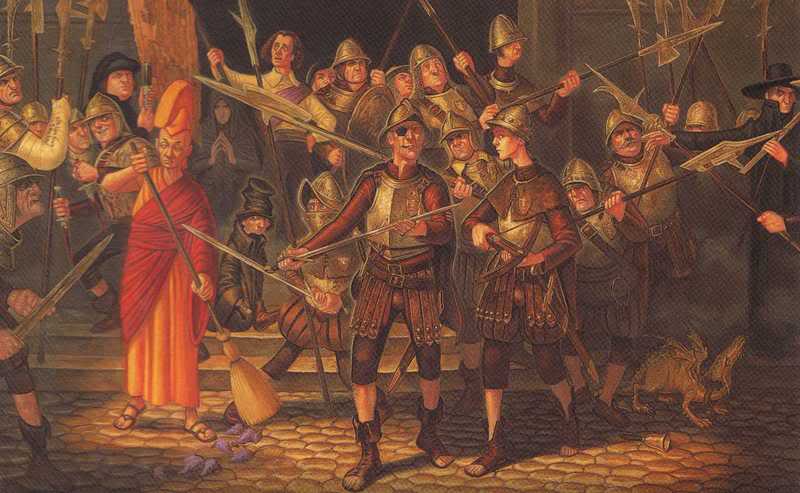You’ll have to forgive me if I get too excited in this article. Quite aside from the fact that ‘Night Watch’ is the book I was most looking forwards to on this re-read, I finally got to it at a time when the subject of revolution and uprising couldn’t be more topical. As I’ve been following the baffling real life horror that is the American election and the protests that have come afterwards, so I have been following Sam Vimes on his own journey of rebellion and fighting against tyranny, and it is impossible to separate the two things in my head. To that end, I don’t think that I should even try to keep them apart; sometimes there is no better to process real life than through the scope of fiction, and few authors know that better than Sir Terry did.
‘Night Watch’ is one of the most popular of the Discworld series, well up there with ‘Small Gods’, ‘Going Postal’ and ‘Mort’ in a lot of people’s favourite lists. In fact, on Goodreads, it is the top ranked of all the Discworld novels. That is no mean feat in a series of over forty books, and I was keen to see why. I didn’t remember much of ‘Night Watch’ from the first time around, other than the fact it was the book in which I remember beginning to love Sam Vimes. I knew there was time travel involved and a case of mistaken identity, but that was about it. You all know my feelings on time travel and parallel worlds in general, so I think it is a sign of how into the Discworld headspace I am that Lu-Tze’s explanation of how Sam travelled back to his own past and became his own mentor made sense to me.
From the very first pages of the book, I could already see why this is the story that made Sam my favourite character. He’s come so far from the drunk mess of a man we met way back in ‘Guards! Guards!’. He’s self-assured now, more deadly than he ever was if he thinks someone is doing wrong, and a loving husband and expectant father to boot. When he’s back in the past, masquerading as John Keel, the man who led the revolution and inspired young Sam Vimes, he’s acutely aware of getting back to his roots, being the policeman he still longs to be. The thought that pulls him up short every time is Sybil, pregnant and waiting for him, and that for me is the biggest show of character development for him. Where once policing was his life, his wife is that now. Nothing proves this more than at the end of the story, when he has been returned to his own present and does not continue his pursuit of the criminal who started the whole thing to begin with. No, this version of Vimes is concerned only with fetching the best doctor he knows to come and attend to Sybil, when the midwife admits she is having trouble with the birth. The catching of the criminal is no more than a footnote to the personal.
‘Night Watch’ offers a glimpse into the history of other characters we know and love. We meet Vetinari, future patrician, as a trainee Assassin, bullied by his fellow pupils but already displaying a lot of the skills that make him a formidable leader. He is, we discover, the only one who puts two and two together and realises that John Keel and Sam Vimes are in fact the same person. It adds a new dimension to the character that I look forwards to exploring in future re-reads. We also get to see Fred Colon, Vimes’ most loyal companion, as he earns his promotion to sergeant. The younger Fred is more willing to take part in dangerous work that the older version tends to shirk, although with the result of this rebellion being the deaths of seven of his friends, it is becoming increasingly easy to see why he becomes cynical and defensive as he gets older. The most fun appearance comes from Nobby Nobbs, an urchin much like the Artful Dodger, who Vimes takes on as an informant and who willingly joins the Watch in their rebellion later on in the story.
There’s a beautiful moment early on, when Colon, Nobby and Dibbler visit John Keel’s grave on the anniversary of his death and Pratchett simply says ‘The three stood in silence. They were not, on the whole, men with a vocabulary designed for times like this.’ ‘Night Watch’ is full of bits like this, small and gently stirring moments. When young Sam asks his older self why old men weep when they sing a rude soldier’s song, Vimes simply replies that they ‘are remembering who they aren’t singing it with.’ I challenge you to read ‘Night Watch’ and not be moved.
Some of the coverage you find on Cultured Vultures contains affiliate links, which provide us with small commissions based on purchases made from visiting our site.

